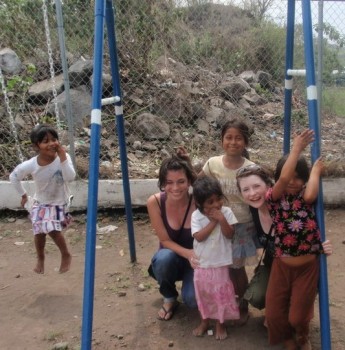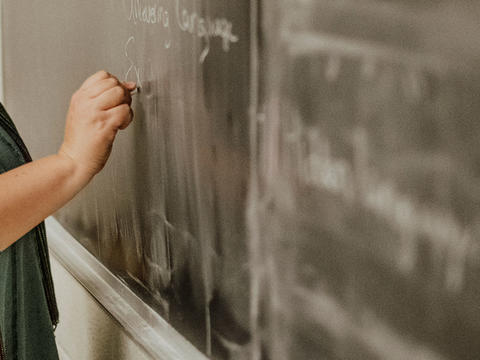Aiding Education in Mexico

Rose Howse '11, pictured with another volunteer and a group of school children, has been traveling through Colima, Mexico with the organization Project Amigo teaching English to underprivileged children.
Details
A ten-hour, overnight bus ride west from Mexico City brought Rose Howse '11 to the state of Colima, Mexico, where she is spending the summer working with the organization Project Amigo in three local villages.
Project Amigo aims to enable poor children in Colima to achieve their highest potential by providing educational opportunities, material support, enrichment activities and medical and dental services. For the first three weeks, Howse worked each morning in a school in the Colima village of Queseria. "Project Amigo has been integral in the building of a school for children who spend each spring in [Queseria], and I quickly found that the most helpful thing I could do here was to lend a hand in the school," says Howse.
All the students at the school use a second-grade workbook regardless of their age or skill. Howse immediately began working closely with one student in particular, who is 14 in a classroom with many seven-year olds. The advanced class teacher, called "Maestro," tries to maintain continuity in his lessons for such a wide range of students by structuring each class around government-provided materials, Howse says, including a copy of the international declaration of human rights and an instructional pamphlet about how to prepare for volcano eruptions, floods and forest fires.
Howse noticed some significant differences between the education offered in Queseria, her educational experiences and even the education in urban areas of Mexico. "For me, as well as the Mexican staff at the school, the delicate issues of cultural relativism come into play daily. The children spend as much time at recess as they do in the classroom, which I at first thought seemed detrimental to an education with so many setbacks," Howse says. "However, it's actually a conscious decision on the part of the school; the cultures in Queseria don't embrace exercise, something which contributes to the cyclic nature of health problems among the poor."
When Howse isn't teaching a classroom full of students, she gives English lessons to those who are interested and sometimes holds one-on-one tutoring sessions with university students. This service is optional, so it attracts the most enthusiastic and motivated students.
"I hope to work in the public education system after Haverford," Howse says. "I hope that this will give me both general experience and the Spanish skills to better communicate with the growing population of Spanish-speaking families in the United States."
--Kayla Hoskinson ‘11



